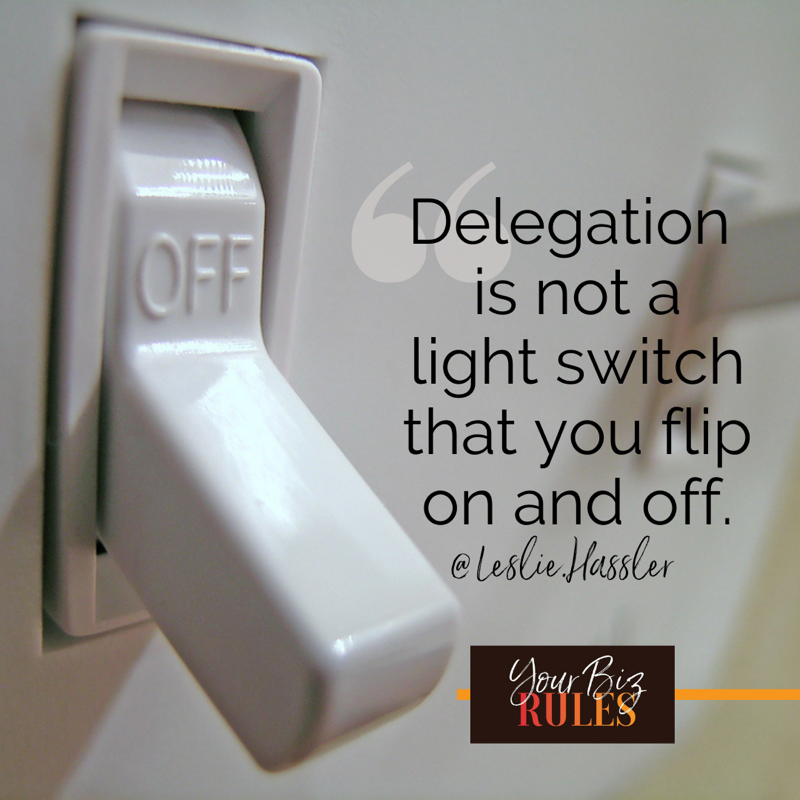How to Structure Delegation to Get Things Off Your Plate
Summary: For small business owners, especially service-based business owners, overwhelm is almost inevitable if you are doing all the work yourself. Mastering delegation and learning to avoid common mistakes when assigning tasks and responsibilities is the key to you being able to focus on your business performance and ability to scale.
It's not always easy but the rewards of delegation are many! Hiring the right team and effectively delegating to them, will free up your time to:
- Focus on your vision for the business and revenue generating activities
- Reclaim time for the people and activities that are most important to you
- Take care of yourself so you can lead your business successfully
This article will help you avoid the pitfalls and help you quickly delegate so you can focus on the things only you can do!
One of my favorite definitions of business is that it is a successful, profitable, commercial venture that can run without you.
And it’s true.
If you are doing all the work in your business, you are bound to get overwhelmed. The growth of the business will be stifled because you can only do so much as an individual.
The secret to growth and scalability is in finding someone else to do the work, so that you can stay focused on the main thing. Which is thinking strategically about business growth and stability.
That’s delegation. Sounds easy, right?
The truth is delegation is easier said than done. For most small business owners—especially owners of service-based businesses—delegation does not come easily. It’s not a simple task that you just check off your list. There are structures that you need to put into place to effectively delegate tasks and transition responsibilities in your business.
Why Delegation is Great for Your Business
Delegation improves business performance and helps with scaling. Which means more revenue, and who doesn’t want to earn extra cash?
To have sustainable business growth and expansion, you must become comfortable with delegating. You must be able to hire the right people and designate tasks to them. This will help you be able to focus on implementing your vision as an entrepreneur.

Without delegation, you might find yourself burned out from overworking and the stress of managing your business. Most small business owners find themselves caught in this trap of doing too much and not having time for their personal lives or time for rest. We like to call it the “sacrifice” of being an entrepreneur.
Ironically, most people start businesses to enjoy the freedom and flexibility of being your own boss.
Getting a team to help with some of the tasks will give you more time for your personal life and the much-needed rest and self-care to run your business with excellence.
Delegation Mistakes to Avoid
There is a wrong way and a right way to delegate. And here are some mistakes that business owners make when trying to implement delegation.
1. Treating delegation as a task
When you talk to a friend or family member about having too much to do, you are told, “Just delegate.” And it’s easy to think of delegation as a task that you can tick off your to-do list. What we end up doing is dumping tasks to someone else and whew! We expect them to magically make things happen.
That’s abdication, not delegation.
2. Giving tasks to the person who always gets the job done
Because you want assurance of quality work, you might find yourself only giving tasks to the person that gets the job done. And we know what that does. It overloads that person.
Soon enough, that employee is overworked and overwhelmed just like you were. You have effectively transferred your problem to them, right?
Your employee will end up being burned out, resentful, and eventually quit. Then you are back to where you started.
3. Not getting employee buy-in and ownership
Employees need to clearly understand their role and what’s required of them. Effective delegation involves enrolling, motivating, inspiring, and setting up your team to succeed. And if this is not done well, your fear of not getting things done correctly becomes a self-fulfilling prophecy. Nothing will get done, or at least not the right way.
How to Effectively Delegate
Now, it’s clear at this point that delegation is a process. It is not a light switch that you flip on and off. It is a process that changes the culture of work in your business.

In most small businesses the business owner is everything—the chief decision-maker, the chief problem-solver, the chief everything. Now, delegation is about changing that culture and fostering employee engagement.
It’s about showing your employee how things should be done so that they can do it themselves. It’s about helping your employees problem-solve and troubleshoot, and then supporting them so that you only do those things that you need to do as the owner and vision-carrier.

Only 12% of businesses have what it takes to scale their business profitably and sustainably.
Take this 10 Minute Quiz & Reveal a Tailored Action Plan for Scaling Your Service Business

Here are three things that you need to keep in mind when structuring delegation for your business
1. Consider the hierarchy
When you are expanding, especially as you are bringing a team on, you need to have a vision of where your hierarchy is going so that you can keep a balance of responsibilities. And a rule of thumb is that one person can only effectively manage three to four people.
Think about that. Do an organizational chart and plan out your hierarchy so that you know who is responsible for what.

The hierarchy—the clearly set out roles and the responsibilities—will keep you from hiring reactively and allow you to hire more strategically. It also helps you understand when it's a capacity issue within an individual or a capacity issue within the business, and you need more people. (Check out this article to learn more about your team's capacity)
2. Practice the power of three

The second thing in being successful when you delegate is to understand that it’s a three-step process.
The first step involves you planning out the process that you’re going to be delegating. If it’s a task, you critically think about the goal, when it needs to be done, and how it needs to be done.
The second step is when you're going to have a meeting with the individual you are delegating to, to enroll and educate. Then step three is when you are going to have a meeting afterward to fine-tune and improve.
It’s important to have that process in place so that you can all check yourselves and move on quickly and efficiently.
If you're going to transition responsibilities—even to a subcontractor—that's a much bigger thing. When it comes to responsibilities, instead of three meetings, it's three months. That's what it takes the average person to reach proficiency. So plan out those three months.
Having that laid-out process makes it easy to transition responsibility because once a person is comfortable with one step, they move on to the next step.
3. Share the love
If you're going to share the responsibility load, then you need to share the love from a monetary perspective. You need to have a reward system built into place, whether it's bonuses or whatever it is.
One of the biggest mindset shifts that business owners have to get past is, “Well, I don't have the money for that.” Chances are you can find a way to get that money because if you want this team member to do a shining job that you’re proud of and that they are motivated to do, then you have to share the love.

Delegation is not a walk in the park. Sure, there might be a million more things to do in between, but I hope that these insights will help you structure delegation in a way that’s long-term, sustainable, and successful in your business.
Think you have what it takes to scale your business? Take the Scaling Rich Quiz today to find out your scaling rich personality.

Leslie Hassler
Leslie Hassler is a popular author and speaker who spends much of her time coaching business owners on how to run their growing businesses by their rules. Delivering high-touch, personalized service, Leslie works with her clients as a partner, not just a consultant (who would pop in, tell you what to do, then leave).
Leslie teaches her clients a structured way to decide what to do first, second, next -- and never – in their businesses, so that they can learn to do it for themselves.
Leslie lives in Dallas with her husband and two kids, so she knows it’s not just about growing the business – it’s about getting the business ship shape so it grows and you can be home in time for dinner.
Leslie speaks on topics such as business leadership, prioritizing the business owner’s To Do list, and how to create and implement a strategic plan for growth.
If you’d like to have Leslie come speak to your group or organization, or present at your event, inquire here.
